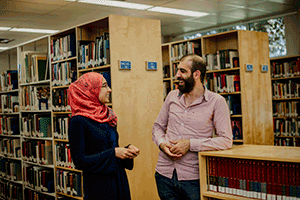Ready to learn more?
Get all the details straight to your inbox!

Luther students can register in Arts, Science, or Media, Art, and Performance. Luther students are U of R students and receive a U of R degree.

Wondering where to live? Our student residence, The Student Village at Luther College, is considered a great choice for first-year student accommodation. Individual private rooms mean you can stick to your own schedule and you never have to deal with roommate hassles.

The Luther Library has over 24,000 items in its collection, 5,000 books checked out per year, and 7,000 students who come through its door per month.

Smaller class sizes at Luther College means more individualized attention and better connections with your professors, classmates, and academic advisors.

Luther College is a great choice for high school to university transition. Enjoy all the benefits of a larger campus, without feeling lost in the crowd. Our community is full of caring mentors and peers to ensure a positive student experience.

Free enrolment counselling support and invaluable one-on-one academic advising are available for all programs at Luther College.

Eating better means studying better. The Luther Cafeteria offers fresh, healthy, nutritious meals seven days a week with a self-serve “all-you-care-to-eat” concept students prefer.

Luther College offers Bundles programs that group together first-year students and classes to give you a great start and help ease the transition from high school to university.
Get all the details straight to your inbox!
By Scott J. Wilson
Writing Across the Disciplines Coordinator, Luther College, University of Regina
"No act of thinking is complete till its products have been set forth in writing" – John Dewey
Writing is difficult because it starts from barely anything: a few ideas, some scattered thoughts, the odd word or two. They are just pieces floating around. So, jot them down, type them in, and spell them out. Write them and then rewrite them and hopefully rewrite them a third (or fourth or fifth) time. Until then, they are wasted potential, but at least they are that. Eventually, they become something. Even then, how can you know if the final product is any good? You can’t, not always, but you can get to a point where you are more certain than not. Getting there takes time and practice. Then, it takes some more. That is the thing about writing, you have to sit down and do it.
Writing is hard
Everyone has something valuable to say; however, developing the means to communicate the idea is as significant as the idea itself. One often cuts more words than one keeps. That is the way it should be. Writing is not a just a means to an end. It is part of the learning process. In fact, for Richard Paul and Linda Elder, "writing is so essential to learning that one cannot be educated and unable to communicate one's ideas in writing form." In other words, the more time spent writing, the more you know, and the better you become at convincing others that you are worth listening to. That is a valuable skill here at university and afterwards in the work force.
Students say it is even harder for them because “they aren’t writers.“ They say it with such certainty, like it is a mutant power received at birth. They have been told that they can’t write, that they are more of a math person: writing just isn’t for everyone. Yet, I have a few jobs at the University of Regina, and most of them involve proving to these miscategorised non-writers that they are mistaken: they are writers; they just need to become better writers. They can do it. It just takes time. It takes dedication. It takes effort. I do not want to sound too much like former NBA All Star Allen Iverson, mostly because we have opposite opinions of the subject, but “we’re talking about practice.”
It is somehow more personal than math or statistics. Students ask teaching assistants or stats tutors for help without a second thought: a secret formula, an answer key, or some sort of certainty. With writing, it is not so easy for us to allow another to judge our work. Writing is intimate even when it is not. For some, incorrect algebra is not an indictment of character, but, for so many, an essay is. However, both are the same: expressions of creativity and skill. They are formulaic, structural, and learnable. I tell all of my students that a draft is just a draft, a work in progress, nothing to be ashamed of. So, ask for help, share your thoughts, and learn the structure while gaining the freedom and confidence affective writing (yes, with an “a”) can provide.
Teaching writing is hard
It takes time: time that is often not available. It entails reading all those drafts of introductions, outlines, thesis statements, proposals, full drafts, frantic doubt-filled emails, and final submissions. It takes even longer to provide thoughtful, meaningful feedback, which is necessary but missing in many cases (Samson). There is less time as class sizes grow or when teaching assistant support shrinks. Teaching writing well requires a strong feedback loop that is best achieved through laddered or scaffolded or nested assignment –“broken down into several low-stakes components – an annotated bibliography followed by a proposal, a draft then the final report, for example” (Samson). It also calls for peer review, considerable planning, and even more patience. Unfortunately, according to Jordana Garbati, only one in five university writing assignments is nested, while only one in twenty involves the chance for students to receive early feedback (Samson), both of which are keys to successful learning of writing (Greenwald et al.). Therefore, teaching writing well requires more nested assignments and less of what Peter Elbow calls “high stakes assignments:” term papers where students are expected to learn the theories and relevant voices in a field and translate that learning into a major writing assignment, usually a term paper (Cavdar and Doe). We should not eliminate these assignments, but assigning them while placing the expectation on students to use feedback from other classes and to use writing and reading skills they have acquired elsewhere is not helping teacher or student (especially if one considers how many term papers are never picked up).
It often requires instructors who never had to focus on learning the craft of writing to become a writing expert without the necessary language, knowledge, tools, or support. These are competent, intelligent people. They are respected in their fields; they publish many articles and books. They say they “know good writing when they see it,” but that they don not feel confident in developing a rubric, giving feedback on the mechanics of writing, or providing a properly designed assignment sheet. They are trying. They give their students what they received when they were students in the same field. It is a vicious circle. We all need to be better at clearly communicating discipline-specific ideas because unless teacher and student “have sufficient knowledge of the unique purposes and characteristics of English as it is used in a student's target field of study, writing instruction will be no different than in general English courses, and thus, less effective in enabling students to successfully carry out profession-related tasks” (Orr quoted in Boyd and Hassett). Having students focus on their writing skills in their first year and leaving the rest to chance just does not work. Students need to know why writing in Kinesiology differs from writing in Business just as much as they need to know the rules of APA or Chicago Style.
Writing Across the Disciplines at Luther College
The Luther College Writing Across the Disciplines (WAD) Programme was created to address these writing-related concerns for students and instructors. We hope the programme will lessen the difficulty and create more conversation and community around writing (and reading) at university. As WAD Coordinator, I provide supplementary writing instruction within courses that traditionally do not focus on writing-specific assignments. I work with Luther College instructors to plan and implement pedagogical strategies to augment the development of written communication skills by students in those courses. In addition, I facilitate in-class lectures and workshops and offer one-on-one instruction to students. Ultimately, I help improve their writing skills beyond first-year required writing courses such as English 100, Kinesiology 101, etc., while encouraging instructors to include more writing-intensive exercises in their courses.
So far, the programme is working very well, and I expect even more success as students and instructors become aware of the value of the programme. Since the Winter 2015 semester, I have had the pleasure of working with 14 courses from Women and Gender Studies 390: Missing Indigenous Women to Psychology 388: Cross Cultural Psychology, to Biology 150: Biological Principles for Non-majors, and Music History 418: Music, Women, Culture to name just a few.
In those classes, and others, I have worked on many projects. Some highlights follow:
In Biology 150, for example, after a meeting with Dr. Mary Vetter about how more writing instruction could be useful in a Biology class, I developed and delivered a presentation on short answer strategies for exams and lab assignments. I also created a Prezi and handout and made both available to the class via UR Courses. Later, after the first lab assignment, Dr. Vetter and I did an in-class short answer debrief. In that debrief, I identified positives and negatives in the first lab assignment responses. It also included a workshop component where students practised writing answers in a claim, reason, evidence, and analysis order, which allowed them to show Dr. Vetter and me the responses in order to receive in-person feedback. Dr. Vetter has seen immediate improvement in student responses and has been able to better explain strategies for improvement to struggling students. She has mentioned that she now has a common language and understanding with the students because of the short answer question framework. This will be a useful tool in many other classes at Luther College.
In History 115: Issues in European History: The Era of Overseas Expansion, I helped Dr. Yvonne Petry with a library research assignment: adding an analyzing the logic of an article template that became a paragraph writing component, and offering suggestions on the assignment. Moreover, I gave a presentation about this template in class and facilitated a research question development workshop (which is another part of this scaffolded/laddered assignment). I will also be offering writing advice on the research papers at the proposal stage. Ultimately, when students realize that it is not just their professor that expects quality writing, they become more motivated to put in time and effort. While those discipline-specific qualities that make for clear, persuasive writing are important, it is also essential to let students understand that excellent writing is excellent writing regardless of discipline.
In Music History 418, I have put together a reflective writing presentation that breaks the genre down into five characteristics: perceptions, contemplations, speculations, interpretations, and conclusions. Dr. Barbara Reul shared some reflective writing resources and ideas that have been added to this presentation. I also created a handout version of the presentation that can be adapted for different classes. I provide advice on the reflective writing journal at the checkpoint stage, and I am available to give writing feedback to students throughout the semester (on reflective writing but also on the research paper). So far, the one-on-one meetings with students have worked well, and having someone outside of the music discipline providing insight on the reflective writing journal has not only resulted in new directions, but has also helped reinforce the theories presented in Dr. Reul’s classes.
Beyond the direct work with instructors and specific courses, the WAD Coordinator is responsible for developing pedagogical tools: presentations, handouts, templates, etc. To that end, I have begun posting such resources on the Luther College Intranet. These include a presentation and handout on reflective writing, a presentation and handout for teaching peer editing, a presentation and template on analyzing the logic of an article, a presentation and handout for short answer question strategies, an MLA Style presentation, an APA Style presentation as well as an APA Style workshop (including a presentation, workshop sample paper, and answer sheet). In addition, I have made available a presentation on teaching students to improve critical reading and another presentation that will help instructors teach students to improve their critical writing. I hope that Luther instructors will be able to use them in their courses (or adapt versions of them that will work). I will continue to create more and gladly accept suggestions for presentations, handouts, or other resources.
There is also the WAD collection at the Luther Library. These are valuable resources for students and faculty that are available on three-day reserve. I have been adding to this collection and will continue to do so. In addition, I meet with students by referral. I do not hold office hours as a drop-in writing centre, as there are many such options available on campus, but meet with students who could use some help with their writing. After the student meeting, I debrief the instructor on not only the problems the student is having, but also on how the instructor might better help students with similar issues. Finally, I will be hosting one WAD teaching circle per semester to discuss newly developed resources, workshop options, and new research or theories on writing instruction.
Of course writing is hard and teaching writing is hard, but doing either alone is even harder. The Luther College Writing Across the Disciplines Programme hopes to change this struggle for students and teachers alike. It is early days, but we are already seeing progress from this collaborative effort.
Works Cited
Boyd, Greg and Marie Hassett. “Developing Critical Writing Skills in Engineering and Technology Students.” Journal of Engineering Education 89, no. 4 (October 2000): 409-412.
Cavdar, Gamze and Sue Doe. “Learning through Writing: Teaching Critical Thinking Skills in Writing Assignments.” PS: Political Science & Politics 45, no. 2 (April 2012): 298-306. DOI: http://dx.doi.org/10.1017/S1049096511002137/
Greenwald, Tom et al. Teaching Critical Skills: A Manual for Course Instructors. York University Centre for Support and Teaching, 1992, 31-33.
Paul, Richard and Linda Elder. The Thinkers Guide to How to Write a Paragraph. Foundation for Critical Thinking, 2007.
Samson, Natalie. “Study Finds a Lack of Structure and Cohesion in How Writing is Taught at University.” University Affairs. Web. Oct. 2015.